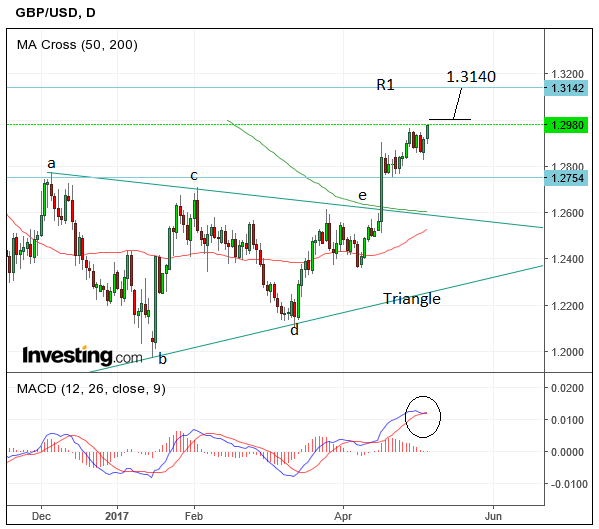Near-Term Forecast for the Pound / Dollar Exchange Rate: Struggling for Traction

The Pound to Dollar exchange rate (GBP/USD) is treading water after rallying strongly following its breakout from a sideways, triangle-shaped chart pattern.
It has already reached the 1.2980 level and could go higher.

The target for how high it will go can be calculated from the height of the triangle by extrapolating it up from the point of the breakout, and this suggests a minimum target at 1.3140 eventually.
This is the level of the R1 monthly pivot where traders often fade the trend and, as such, it could very well witness a pullback or complete reversal.
The MACD momentum indicator is due a pullback, which may very well set up a divergence with the exchange rate, however, it is still too early to see this as a bearish sign, particularly as the MACD has not yet crossed its signal line.
We remain cautiously bullish despite the current rally looking a little over-extended and see a break above the 1.3020 level as providing confirmation of a continuation up to the aforesaid target at 1.3140.
However, others are less optimistic.
"In the near-term, we have developed into a channel with support at 1.2855 and resistance 1.3030. Our studies are still biased for a move back towards 1.25-1.23 within the medium-term range process," says analyst Robin Wilkins at Lloyds Bank Commercial Banking.
Lloyds are looking for a breakdown through that support to start confirming this view.
"Further supports below lie at 1.2710 and then 1.2625-1.2600. A move through 1.3075 would force us to review this short-term outlook," says Wilkin.
Data to Watch for the Dollar
Stepping away from the technical studies, the major economic data release for the Dollar in the week ahead is Inflation (CPI) in April, out on Friday 12 at 13.30 GMT.
Higher inflation will drive up the Dollar as it will thicken expectations of a June interest rate hike by the Federal Reserve and currencies generally rise as a rule when central bank’s hike rates.
Higher inflation would also suggest to traders that the Federal Reserve will be looking to raise interest rates at a more agressive pace over subsequent months.
Headline CPI is expected to rise 2.2% from the previous year and 0.2% from March; Core CPI is expected to rise 0.2% by the market but only 0.1% by TD Securities.
Out at the same time is US Retail Sales, which is expected to rise 0.6% in April compared to -0.2% in March. They are also important as they are a measure of consumption, the major driving force in the US economy. Higher readings mean stronger Dollar.
Canadian-based bank TD Securities are slightly less optimistic, saying they think Retail Sales could rise by a more muted 0.4%.
“We look for retail sales to rise 0.4% in April, slightly below the market consensus as we expect some pullback from the positive late-Easter effect on March sales,” said TD Securities.
Retail Sales will be key as a measure of economic growth, according to BK Asset Management’s Kathy Lien.
“While job growth was good, the real question is whether it translates into spending. Consumer consumption has been very weak but according to the most recent FOMC statement, fundamentals underlying consumption growth remain solid,” said Lien.
“Commentary from Federal Reserve’s Dudley and Harker, who are both voting members of the FOMC – the Fed’s interest rate-setting board – could also impact on the way the Dollar trades as they “represent opposite sides of the dove-hawk spectrum,” said BK’s Lien.
Data, Events to Consider for the Pound
From a data perspective, the main release for the Pound is the Bank of England (BOE) rate meeting and the BOE May inflation report at 12.00 GMT on Thursday, May 11.
No change in policy is forecast because of the ‘purdah’ preventing the authorities from making major announcements and changes to policies in the run-up to the general election.
The BOE may downgrade growth expectations and raise inflation (notwithstanding the recent fall in oil), but according to analysts at Canadian lender TD Securities, the governor is expected to, “steer things back to neutral during the presser.”
Barclays expect the communication to be slightly hawkish, in an effort to boost the Pound and keep inflation at bay. Like TD they also see the bank likely to forecast inflation to rise and GDP to fall, although only during 2017, as falling oil prices will bite in 2018, slowing inflation in the longer-term.
“As for the communication, we believe the Committee will be eager to repeat its slightly hawkish message from the February inflation report, keeping the focus on inflation, and banking on the support provided to sterling to mitigate risks of excessively high and sticky inflation. Changes in forecasts will be consistent with such a move sideways as we expect GDP growth to be revised slightly lower but inflation slightly higher.
Other important data released this week includes the RICS House Price Balance (Apr) at 00.01 on Thursday, May 11, Industrial and Manufacturing Production at 09.30 on the same day and the Trade Balance in March, also at 9.30.





